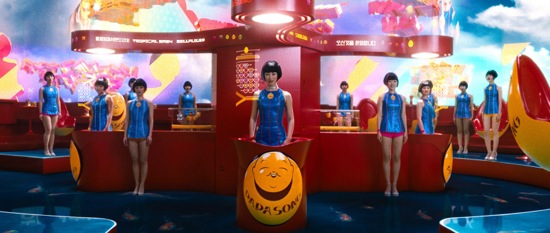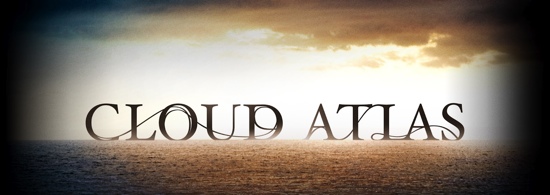“Our lives are not our own — we are bound to others, past and present. And by each crime and every kindness, we birth our future.”
Over the summer, I was invited by The Screening Exchange to see a four-hour preliminary cut of Cloud Atlas. I couldn’t make the pre-screening but was intrigued by the concept and apparent scale of the project. It’s now clear why early cuts are so long; Cloud Atlas is one of the most ambitious films to come out of Hollywood in recent history. The six interrelated stories span multiple centuries and encapsulate some of the most universal and resonant themes of the human experience.
Each of the six stories that constitute Cloud Atlas can be broadly categorized as the struggle for freedom by people working against the status quo. Although each story stands independently, a striking similarity exists between all of the characters. Nevertheless, there is a great disparity between the conflicts that the characters face and the contexts in which they face them. In this way, the gamut of moods and tribulations is impressively rich: a broke publisher tries to escape a nursing home, a tribal leader witnesses the destruction of his lifestyle, a journalist fights to avert a global energy crisis.

What’s important, though, is that the characters of Cloud Atlas all experience some form of reincarnation and seem to encounter the same types of problems in each of their lives. As Halle Berry’s Luisa Rey puts it, she’s “just trying to understand why we keep making the same mistakes… over and over.” There’s a clear progression of time, and the audience has no trouble distinguishing between the different periods depicted along the way, but it’s the wavelike repetition of human themes that comes through in the film — an overt disregard for humanity’s rapid technological progress in favor of showcasing its sadly stagnant spiritual progress.
In this sense, Cloud Atlas is groundbreaking and unique. At least in terms of ambition, it is easily the year’s most epic film.

Given the Wachowskis’ stylistic prowess, it’s impossible to avoid judging the action sequences and effects work in Cloud Atlas in the context of their other films (namely The Matrix trilogy). Frankly, both the action sequences and effects shots are simply not up to par, even when compared to the first Matrix film (which recently turned thirteen years old). It is understandable that action and effects sequences would not be a top priority in an emotional drama like Cloud Atlas, but at times, the CGI renderings are distractingly bad, and the gunfights are seemingly unmotivated. Even more strangely, multiple hyper-violent and sexualized scenes seem either out of place or in poor taste in the context of the film’s overall message.

For the most part, the acting in Cloud Atlas is great, and the phenomenal makeup work makes for some truly amazing character transformations. Tom Hanks and Ben Whishaw stand out, but the whole cast does an amazing job balancing and differentiating their characters. One of the unfortunate side effects of having so many characters, though, is that it does become difficult to identify with more than one or two at a time. While it’s satisfying to see any of them succeed, the audience struggles to stay engaged with the characters throughout all six stories of the film. (You could argue that since the characters reincarnate there are actually very few, but realistically, I’m referring to their persons as well as their specific situations.)
The temporal design of Cloud Atlas is also very impressive, and the editing style works surprisingly well. A variety of great thematic cuts tie the various time periods together in a creative way (e.g. cutting on moments involving water or hands). However, John Toll and Frank Griebe’s need to intercut between various story lines without interrupting the pace of the film (which often results in bland telephoto closeups) effectively clips the wings of what could have been some of the most spectacular cinematography in recent history. While this decision makes for smoother editing and less jarring transitions in production design, it detracts from the visual style of a film that previously had the potential to develop six unique and beautiful styles (see Wally Pfister’s work in Inception). It instead exhibits one fairly vanilla style throughout. All the same, it’s remarkable that such a complex film even cuts together at all, and editor Alexander Berner cranks out a very fluid cut, which uses a clever tag-team editing philosophy to relate two or three distinct plot lines simultaneously.

Thematically, Cloud Atlas is quite exceptional. It’s a treatise on the power and importance of cause and effect and the motivations behind human actions and emotions. Furthermore, it shows the tremendous power and importance of seemingly small actions: when told that his dissenting action is “no more than one drop in a limitless ocean,” Jim Sturgess’s Adam Ewing replies, “What is any ocean but a multitude of small drops?” Finally, Cloud Atlas reflects on the power of storytelling and shows that the only way to improve is to consider the experiences of humans past to learn from our mistakes.
 With Cloud Atlas, Tom Twyker and Lana and Andy Wachowski take an enormous leap of faith and mostly land it, if somewhat awkwardly. The film’s messages are timeless and incredibly powerful, and the final act is executed in a way that is particularly effective. While their efforts are admirable, there is a somewhat disappointing sense of unrealized potential in its execution — perhaps only because the themes tackled in Cloud Atlas are so gargantuan that anything short of perfection is a letdown. Cloud Atlas is far from perfect, but it is an epic and unique cinematic experience that should not be missed. I look forward to a potential director’s cut.
With Cloud Atlas, Tom Twyker and Lana and Andy Wachowski take an enormous leap of faith and mostly land it, if somewhat awkwardly. The film’s messages are timeless and incredibly powerful, and the final act is executed in a way that is particularly effective. While their efforts are admirable, there is a somewhat disappointing sense of unrealized potential in its execution — perhaps only because the themes tackled in Cloud Atlas are so gargantuan that anything short of perfection is a letdown. Cloud Atlas is far from perfect, but it is an epic and unique cinematic experience that should not be missed. I look forward to a potential director’s cut.
 twitter
twitter subscribe
subscribe tip us
tip us
[…] Bendinelli, Culture Milk: “For the most part, the acting in Cloud Atlas is great, and the phenomenal makeup work makes […]